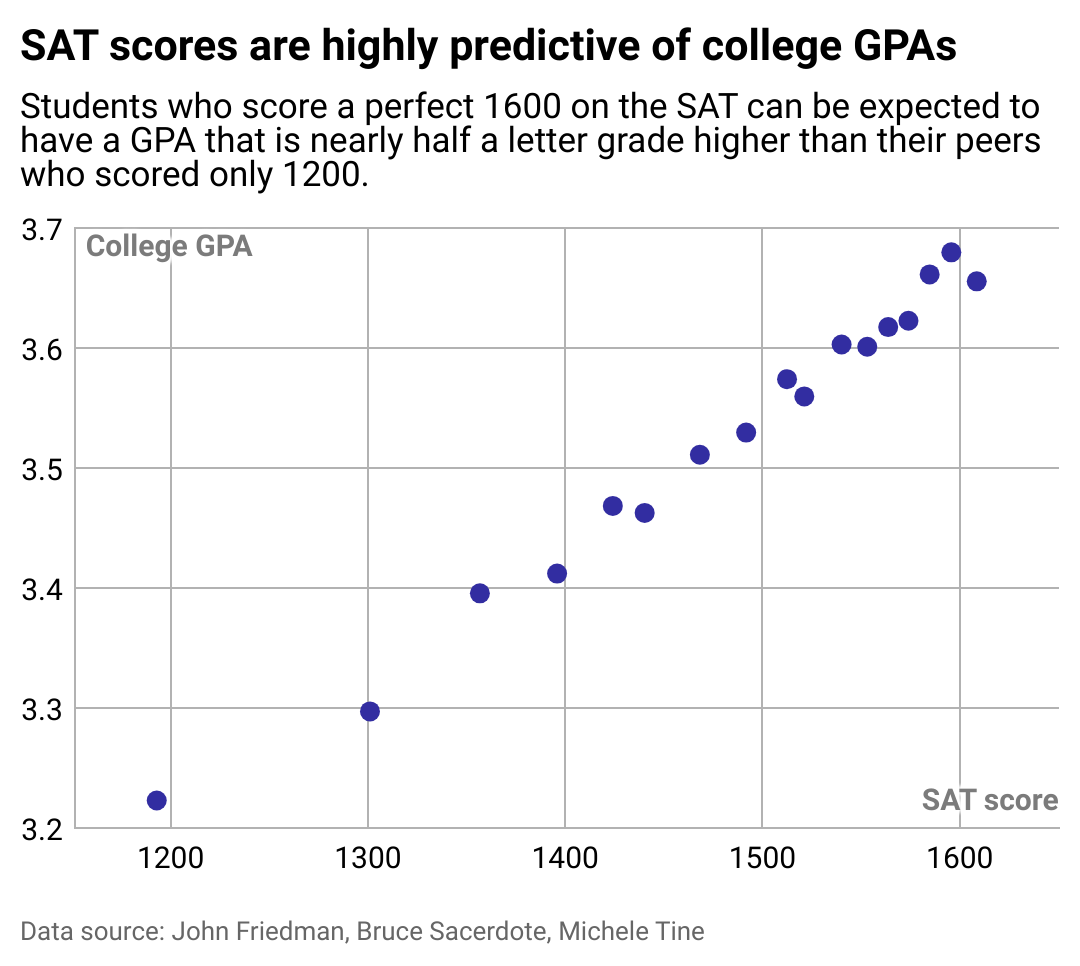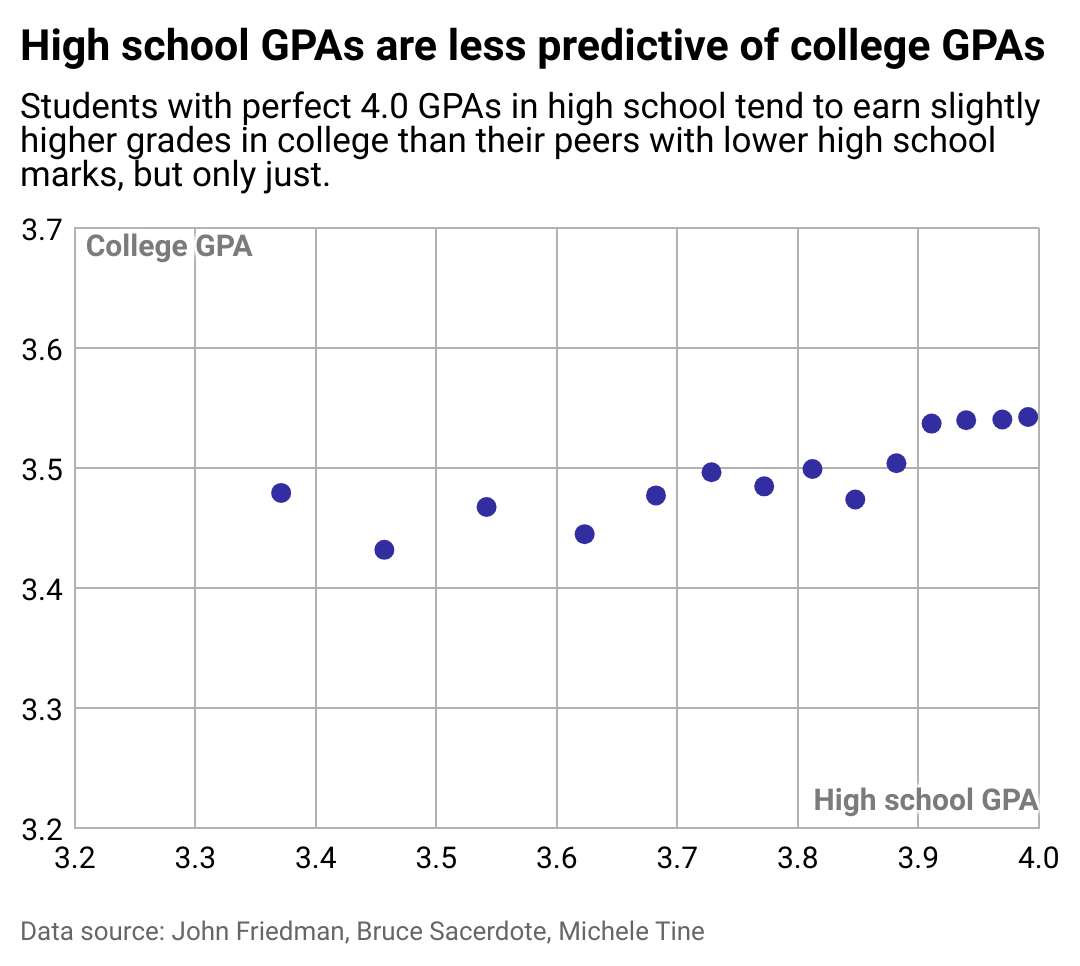What do standardized tests say about college achievement?

Canva
What do standardized tests say about college achievement?
Students taking a test.
Every year, millions of high schoolers prepare for the arduous process of college admissions. Most will take either the SAT or the ACT, multihour examinations that can feel like the climax of an epic battle students have been waging ever since they entered the halls of formal education.
But is it a battle worth fighting in the first place?
The SAT is one of the longest-standing standardized college admissions in the United States. Along with its counterpart, the ACT, these tests have been at the center of heated debates. Some say these tests only serve to reinforce racial inequities in education. Supporters of SAT and ACT scores say that they help universities understand how likely students will be to succeed in college by predicting grades, chances of graduation, and success after college.
Numerade analyzed academic research to see what standardized test scores say about academic success.
The SAT contains two sections: math and evidence-based reading and writing. Most answers are multiple-choice, but some math questions require entering an answer instead of selecting one. An optional SAT essay was discontinued in 2021, however, a small number of schools still choose to offer it.
The ACT is a little different in that it contains four sections: English, math, reading, and science. All of its questions are multiple-choice, and it has an optional writing section that may be required by some universities.
![]()

Numerade
Standardized testing may be better predictors than generally supposed
A scatterplot showing that students with high SAT scores tend to get higher college GPAs.
In a study published in January 2024, Harvard-based research initiative Opportunity Insights, along with researchers from Brown University, Dartmouth College, and the National Bureau of Economic Research, investigated the value of standardized test scores in the college admission process. They found that SAT and ACT scores—but, surprisingly, not high school GPA scores—can better predict academic success in college. “Test scores have vastly more predictive power than is commonly understood in the popular debate,” John Friedman, the lead author of the study, told The New York Times.
The study looked at students who were admitted to all eight Ivy League colleges plus Stanford, Massachusetts Institute of Technology, Duke, and the University of Chicago between 2017 and 2022. It found that students with perfect scores on the SAT or ACT, 1600 or 36 respectively, achieved a 0.43 point-higher first-year college GPA than students who earned SAT and ACT scores of 1200 and 25. However, students with a perfect (scaled) GPA of 4.0 in high school achieve less than a 0.1-point higher GPA in their first year of college than students with a high school GPA of 3.2.
Some have raised concerns that these standardized test scores may not show the full picture. They worry these tests could be biased against students who aren’t able to afford the additional cost of tutors or other resources that can help them prepare for college, a question the Opportunity Insights paper also answered. Controlling for family income, race, gender, and legacy status, the study found that there was no evidence that students from higher-resource backgrounds performed better than peers from lower-resource backgrounds. In fact, their college GPAs were practically identical.
All together, the researchers concluded that standardized test scores may help highly selective colleges provide upward mobility and accept students from a wide range of backgrounds.

Numerade
A history of imperfectly measuring potential
A scatterplot showing that good high school GPAs do not necessarily imply good college GPAs.
Standardized tests emerged alongside the growth of publicly funded education in the mid-1800s. As more children entered the education system, oral examinations were replaced with standardized written tests.
The first standardized college entrance exams in the U.S. appeared with the College Entrance Examination Board in 1900, formed from 12 colleges, including Harvard University and Columbia University. SATs were introduced less than a century ago in 1926, and ACTs came in 1959. Both became staples of the college application process.
In recent years, however, some have started to doubt the efficacy of standardized tests for college applications. In May 2020, for example, the University of California decided to drop SAT/ACT scores to allow for fairer evaluation of college applications.
The COVID-19 pandemic spurred other universities to reconsider their SAT/ACT policies too as the testing bodies were forced to close temporarily. During this time, many colleges made test scores optional.
Since then, however, some colleges such as Dartmouth, Yale, and Brown have announced that they will once again require applications to include standardized test scores. Other colleges however, such as the University of California system, have declined to even consider these scores, while others like Emory and Vanderbilt have extended test-optional policies.
Whether or not colleges decide to include standardized test scores in their admissions process depends on views about how well they help identify the most academically prepared students.
Previous research published in October 2023 from Opportunity Insights shows that students from less advantaged backgrounds receive lower standardized test scores on average and are less likely to undergo testing than peers from higher-income families. Only a quarter of children from the bottom 20% of income distribution take the SAT or ACT versus about 80% for those in higher-income families. For those who do take the test, only 2.5% of those in the lower-income bracket score 1300 or higher versus 17% for those in the top 20%.
With the findings from the latter Opportunity Insights research, the SAT and ACT may easily be dismissed as tests only for the wealthy. However, economist David Deming, who worked on the paper, cautions against oversimplifying these exams as “wealth tests.” Doing so overlooks their capability to help administrators discover the potential in candidates regardless of background.
He argued that if SATs or ACTs were removed altogether, it might disadvantage lower-income students even more. Deming told the Harvard Gazette, “If you get rid of the SAT, as many colleges have done, what you have left is things that are also related to wealth, probably even more so. Whether you can write a persuasive college essay, whether you can have the kinds of experiences that give you high ratings for extracurricular activities and leadership; those things are incredibly related to wealth.”
Story editing by Carren Jao. Additional editing by Kelly Glass. Copy editing by Tim Bruns.
This story originally appeared on Numerade and was produced and
distributed in partnership with Stacker Studio.